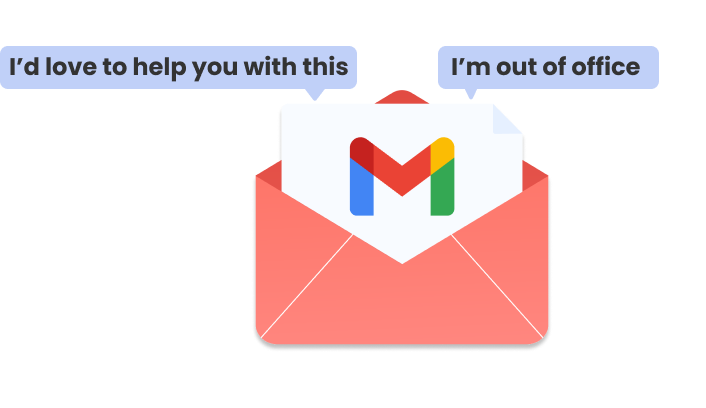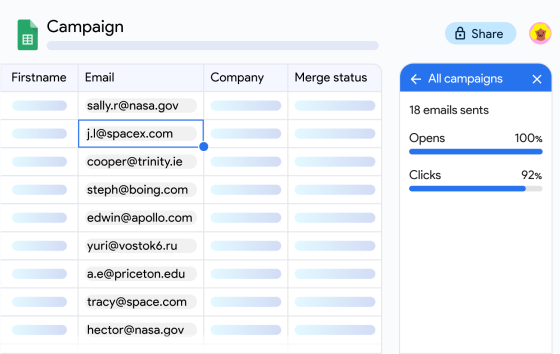It’s easy to get stuck and second-guess yourself when writing business emails. You want to make sure you come across as intended and that what you’re asking or communicating is clear.
That’s why we’ve created a list of business email examples and templates you can use for common business situations. From outreach emails to project updates and follow-up reminders, in this article, we have examples for any business scenario.
How do you write a business email?
Before we jump into the examples. The real is to write business emails over and over again without referring to templates by keeping in mind these core principles:
- Your emails should be mistake-free — We recommend using tools like Grammarly (free) to spell-check your emails before sending them.
- Clearly formatted — The best business emails are easily scannable. Forget walls of text break your emails up where paragraphs are no more than 3 lines long — use bullets for key points — and make your ask clear.
- Stick to the rule of one — Your email should have one clear purpose. If you’ve got multiple requests, split your email up where possible. Most people see their email as a to-do list, and if you’re asking multiple things, you’ll be pushed down the list.
- Consider the tone of your email — How you speak with your close colleagues will likely be different to a new contact you have just been connected with, so how you start your email and sign-off will be different.
- Think about your subject line— Often the biggest obstacle to getting the most out of your email is getting your email opened. Instead of crafting a bland subject line like ‘Update,’ consider building curiosity to open what’s inside your email. like ‘I think you’ll like this…’
10 swipe-worthy business email examples and templates
1. Job application
If you’re applying for a job, you need an email to go with it to catch the hiring manager’s attention. Now depending on the industry you work in depends on the tone you use here. If you’re applying for a role at a startup, you can keep it more casual. But if you’re applying for a corporate role, you’ll want to keep things more professional.
Here’s an email example you can adapt to your specific scenario.
Dear [Hiring Manager],
I’m writing to express my interest in the [job title] position advertised on your company’s website. Please find my cover letter and résumé attached below. Based on my [background] where I [example], I believe I’d make an asset to your team.
Thank you for considering my application. I’m looking forward to speaking with you about this position.
Best Wishes, [Your full name]
2. Introducing business contacts
If you want to introduce someone in the business setting, that might be a colleague, client, or people who should connect for mutual benefit. Here’s an introduction email that can be adapted to your needs.
Dear [Recipient’s name],
I hope all is well with you. I wanted to introduce you to [contact] who handles [X]. I thought it was worth connecting you both as I know [recipient] will soon need help with [X].
Best wishes, [Your full name]
3. Outreaching to target clients
If you’ve got a company in your sights you’d like to work with, this business email example is perfect for raising attention and starting a conversation with a key contact you’ve identified.
Dear [Recipient’s name],
My name is [name]. I saw your [recent news] and wanted to reach out to you.
I’m a [your position/role] who helps companies like yours with [pain point] so they can [outcome].
I saw you’re looking for help with [project/work].
Is this still something you’re thinking about?
Best regards, [Your full name]
4. Updates on business operations
From time to time, you might need to tell business contacts about important changes to opening hours, out-of-office notices, or new systems/policies in place. When communicating updates, the key thing to remember is to clearly state the update and invite contacts to respond with any questions.
Dear [Recipient’s name],
I wanted to let you know in advance that I will be out of the office between [date] and [date].
My colleague [name] will be taking over your project.
I am aware the date is fast approaching. If you have any questions, I will be sure to assist you before I handover.
Best regards, [Your full name]
5. Confirmation emails of purchase/services
As part of the day-to-day running of a business, you need to confirm purchases and agreements over email as written proof between both parties. If you’ve spoken about something on the phone, it’s good to follow up with a confirmation email. Here’s a business confirmation email example you can adapt to your needs.
Dear [Recipient’s Name],
Thanks again for taking the time to chat with me. It was great to chat about how things are going, catch up, and hear your upcoming plans this year!
I’ve just sent you the invoice and agreement to kick off our project.
Could you get this signed and paid to secure our kickoff slot of Wednesday (23rd May) next week?
Please let me know if you have any questions.
Best regards, [Your Full Name]
6. Referral request
As a business that wants to expand its client roster, one of the best ways to acquire new clients is through word-of-mouth referrals. Here’s a business email example you can use to ask for referrals.
Hi [Client],
We currently have a couple of spots available in our calendar for Q2 and would love it if you could pass my details on to anyone you think could benefit from [the outcome you deliver].
Thanks for all your support! [Your full name]
7. An email asking a question
You might want to send a business email to a client, colleague, or partner if you have a question about an order, appointment, or other work-related matter. When you write this type of business email, you should clearly state the question and provide context for your inquiry.
Hi [Name],
I am emailing you regarding the collection for your most recent purchase.
We have two locations, and you haven’t stated which one you would like to collect from. Would it be [location] or [location]?
Please respond at your earliest convenience to ensure we have your order ready at the correct address.
Best regards, [Your full name]
8. Reminder email
If you’ve got an upcoming event, be it a deadline, meeting, or task, it’s important to follow up with reminders so everyone is on the same page and things don’t end up forgotten. Here’s a simple reminder email example you can adapt to your specific use case.
Dear [Recipient’s name],
I wanted to shoot you a friendly reminder about our meeting tomorrow at [time and place].
This shouldn’t be any longer than one hour, and there’s nothing to prep.
If you have any questions before this meeting, do reach out.
Looking forward to seeing you, [Your full name]
9. Follow up email
Follow-ups are arguably the most important type of business email. More often than not your original email or task makes its way down people’s to-do list, so you need to follow up. We’ve written an article walking you through when’s best to follow up — how many follow-ups you should send — and how to cue follow-ups in advance if no response (available here), but this email example should get you started.
Hello [Recipient’s name],
Hope you’re good? Checking in to see if you need any extra hands with [task] to meet our deadline of Tuesday next week?
Best wishes, [Your full name]
10. Reply to all staff email
Sometimes in a team setting, you need to send an email to everyone on your team about an upcoming event or project, perhaps to check everyone’s availability. This email template is ideal for when you want to ‘reply-all’ to your contact list to let everyone know about the next steps.
Hi All,
Thank you for your quick responses about the upcoming meeting regarding [the topic]. It seems the best time for us to meet based on everyone’s availability is 13:00 next Monday (13th April).
I have added the meeting to everyone’s calendars, but you can also accept the meeting via this link.
Best regards, [Your full name]
Key takeaways (and next steps)
Writing business emails can take up a large part of your day, and a good chunk of that is spent figuring out what you should say and how you should say it.
Our hope here is that these business email examples can give you a strong starting point for a variety of scenarios. But remember, the most important thing to remember when writing a business email is to keep things clear, to the point, and well-formatted.
If you’re spending a good portion of your time sending business emails in Gmail, Mailmeteor allows you to create reusable email templates, track opens, send auto-follow-ups, and send personalized mass emails.
Frequently asked questions about business emails
What are good email addresses for business?
When sending business emails, you want to avoid sending emails from an @gmail.com address and instead want to send emails from @yourdomain.com to come across as professional.
Is info@ a good email?
Yes, info@, hello@, and help@ all make great email addresses that are easy to remember for customers when interacting with your business.



